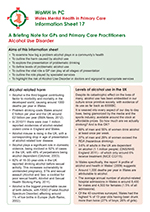News & Events
Information sheet 17 - Alcohol Use Disorder

This information sheet aims to:
- To examine how big a problem alcohol plays in a community’s health
- To outline the harm caused by alcohol use
- To explore the presentation of problematic drinking
- To define levels of problematic alcohol use
- To outline the vital role a GP can play at all stages of presentation
- To outline the role played by specialist services
- To highlight the risk of Alcohol Use Disorder in doctors and signpost to appropriate servicesLike all our Information Sheets this latest document aims to help raise awareness about and improve mental health services across the country.
Download the information sheet here.
Each of our sheets have been developed to provide valuable information, training and support tools on primary care mental health in Wales. Their publication comes under the set objectives of our Gold Standard Project which has set the goal of providing good communication on mental health issues. We have a range of other Information Sheets which are all available to download and view on and from our Information Sheets page.
If you have any questions about Information Sheet 16 or trouble viewing or downloading it please contact our Project Manager Lesley Hills via email at lhills@rcgp.org.uk or on 029 2050 4516.
GPs and charity call for sustained focus on improving primary mental health care in Wales
Two reports have been published today about people’s experiences of using and delivering primary mental health services in Wales, with both calling for a sustained focus on improving support for patients and health care professionals.
‘Experiences of delivering primary mental health care’ has been written by Wales Mental Health in Primary Care (WaMH in PC) - a special interest group of the Royal College of GPs in Wales. It highlights key issues and challenges raised in a Wales-wide survey of GPs and other primary care staff, including workload, support for practitioners, barriers and challenges for delivery and the impact of welfare reform and the Mental Health (Wales) Measure.
In conjunction, Welsh mental health and wellbeing charity Gofal has published ‘Snapshot 3’, a report based on the results of their third annual survey about patient experiences of primary mental health services. Over 800 people responded to the Wales-wide survey, which was conducted at the end of 2014 and captured patient views on the empathy and understanding demonstrated by professionals, treatment and support options offered to them, waiting times and the impact of primary mental health services on their mental health and wellbeing.
These reports have been published two and a half years after the implementation of Part 1 of the Mental Health (Wales) Measure, a ground-breaking piece of Welsh legislation which aimed to increase access to treatment and support in primary care and improve patient outcomes. The Gofal survey shows that some progress has been made in expanding treatment options and reducing waiting times, but further improvements are required to achieve the Measure’s aims.
Both WaMH in PC and Gofal have reiterated their support for the Measure, but conclude that more needs to be done to support primary care professionals and improve services for patients. WaMH in PC and Gofal are calling on the Welsh Government, health boards and local authorities to maintain a sharp focus on improving primary mental health services in Wales.
Key conclusions from the reports include the need to:
-
Improve access to psychological therapies
-
Improve support for GPs and other primary care staff
-
Integrate services more effectively both within and outside the NHS so that patients receive a more streamlined and holistic service that addresses all of their needs.
-
Improve the range of treatments, information and support options for patients
-
Measure outcomes for patients, not just processes
WaMH in PC report highlights:
-
GPs and primary care staff have experienced an increase in the proportion of time spent on mental health related work.
-
GPs and primary care staff feel confident in relation to the early identification, assessment, diagnosis and treatment of people with mental health problems. However they express lower levels of confidence in relation to understanding, promoting and signposting for the social and economic factors relating to mental health and wellbeing.
-
The majority of respondents (59.3%) said that workload pressures, increased complexity and other practice-related issues have had a detrimental impact on their wellbeing.
-
72.7% of respondents said that mental health is ‘difficult’ or ‘very difficult’ to manage at primary care level.
-
Respondents said that the top three barriers to successful delivery of primary mental health services were timely access to psychological therapies (85%), timely access to secondary care services (63.9%) and service capacity (62.4%).
-
46.1% of respondents said that the Mental Health Measure has been moderately effective on their ability to manage common mental health problems but 51.6% said that it had not been effective.
-
77.3% of respondents said that changes to the welfare system had led to patients attending their practice marginally or significantly more often.
-
88.5% of respondents felt that there should be greater investment in time and resource in mental health care in Wales.
Gofal report highlights:
-
Over 50% of patients described their GP as ‘extremely’ or ‘very’ understanding and empathetic. But 25% describe their GP as only ‘slightly’ or ‘not at all’ understanding and empathetic – a percentage that hasn’t improved since the Measure was implemented.
-
The proportions of people being offered advice and information, psychological therapies, books on prescription, physical activity and being signposted or referred to another service have increased. However, prescription medication remains the dominant option with 72.3% of respondents being offered it.
-
Waiting times for assessments and support services have decreased since the implementation of the Measure, but some people are still waiting too long for talking therapies.
-
The proportion of people reporting that primary mental health services had a positive impact on their mental health and wellbeing has not increased since the Measure was implemented.
Dr Mark Boulter, Chair of WaMH in PC said:
“Our survey shows that the medical, social and economic complexities of mental health can be difficult to manage at a primary care level and workload pressures are having a detrimental impact on the wellbeing of GPs and other primary care staff. A key part of the Mental Health (Wales) Measure is the provision of support and advice to the primary care workforce and we believe that there needs to be an increased focus on delivering this element, which in turn will ensure that patients get the best possible treatment and support.
“Our report also highlights the need to improve access to psychological therapies and better integrate services within and outside of health in order to reduce barriers and deliver better patient experiences.”
Ewan Hilton, Executive Director of Gofal said:
“While we welcome the improvements in treatment options and waiting times it is disappointing that the Measure does not appear to have had an impact on patient outcomes. It is crucial that Welsh Government, local health boards and local authorities maintain a sharp focus on primary mental health services and deliver further improvements to meet people’s needs and enhance outcomes.
“We fully support WaMH in PC’s call to improve support for GPs and other primary care staff. It is essential that the primary care workforce is equipped with the right information, skills and referral routes to intervene early and deliver the best possible patient care.”
WaMH in PC Managing Dementia in Primary Care Training Resource wins national awards

The training resource was entered into the prestigious 2014 Peer Awards for Excellence earlier this year under the category of Corporate Responsibility.
However, at the awards ceremony at London's Waldorf Hilton in September they ended up walking away with 3 separate awards including the overall prize.
The Managing Dementia in Primary Care Training Resource saw-off strong completion from RBS, British Gas, British Airways, First Capital Connect and many more and was announced as the winner in the following categories:
- Overall winner of the 2014 Peer Awards for Excellence - Achievement: Development of an inspirational initiative that improves life for customers, businesses and our society
- Overall winner of the Corporate Responsibility Award - Achievement: Recognition and impact on the broader community and the environment
- Winner of the Education of the Community Award - Achievement: Giving hope to people working in primary care by providing them with a deeper understanding of dementia
The Royal College of GPs in Wales is leading the way in Dementia training as the number of GP practices across Wales receiving the new training resource has now reached 113.
The dementia training resource targets all practice staff with the aim of increasing awareness and knowledge of dementia which now affects around 850,000 people in the UK. The key areas covered in the training are:
- Timely diagnosis
- The role of the memory clinic
- Living with dementia
- Advanced care planning
- Reducing the risk of dementia.
You can access and download the training resource materials from the following link - Managing Dementia in Primary Care - Training Materials.




